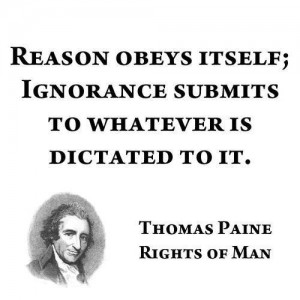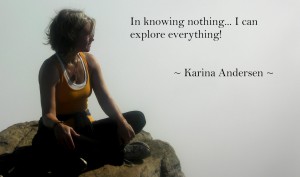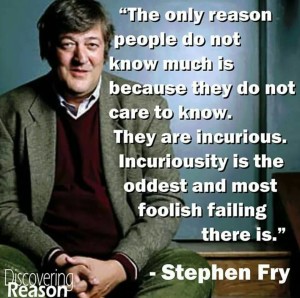☆ 「無知」可以是一種心態 attitude
Most people are not just comfortable in
their ignorance, but hostile to anyone
who points it out.
( Plato )
肯定「神話」myth 是事實的人,是「無知」,
肯定「神話」完全荒謬的人,亦是「無知」。
肯定《左傳》中所說的「六鷁退飛過宋都」完全荒謬,
不明白當風太大,風速大過鳥飛速度的時候,
退飛是絕對可能的,這就是「無知」。
相信一些自己從沒有深入研究,不很清楚的東西,
但拒絕去思考、拒絕接受批判,就是「無知」;
排斥一些自己毫無認識的東西,就是「無知」。
The highest form of ignorance is when you
reject something you don’t know anything about.
( Wayne Dyer )
The defects and faults of the mind are like
wounds in the body; after all imaginable care
has been taken to heal them up, still there will
be a scar left behind, and they are in continual
danger of breaking the skin and bursting out again.
( Francois de La Rochefoucauld )
有一些人討厭思考,安於「無知」;
有一些人懶得思考,安於「無知」;
有一些人懶得思考,卻並不知道自己「無知」;
最特別的是那些不懂得在真理面前謙卑,
喜歡半桶水思考,老氣橫秋,極愛面子,而又拒絕接受批判的人;
一旦這種人掌權,就會顯現出真正令人恐怖的「無知」。
The best things in life are free, but so are evil
foolishness, ignorance, laziness and superstition.
( Jason Ling )
討厭思考,懶得思考,安於「無知」的人,
往往傾向於將複雜的問題看成簡單,處理時醜態百出。
We are too much accustomed to attribute to a single
cause that which is the product of several, and
the majority of our controversies come from that.
( Marcus Aurelius )
政治是一門複雜的管理學,但不少思考力不足的政客,
參與政治多年,懂得討價還價和檯底交易之後,
就老氣橫抽,覺得自己已經是專家,有資格對政治三道四,
甚至幻想自己有能力統治國家。
不願意去認識自己的人,容易「無知」;
不願意去認識別人的人,容易「無知」;
拒絕「自我批判」的人,容易「無知」;
愛面子多於愛理性的人,容易「無知」;
重視意志和毅力而忽視智慧的人,容易「無知」;
以為實現理想不需要足夠智慧的人,容易「無知」;
愛「名、利、權」多於愛理性的人,容易「無知」;
分不清「迷信、信念和信仰」的人,容易「無知」;
不知道自己的「無知」的人,才是真正的「無知」。
無知而又愛面子的人,容易無恥,
所以著名文學家 Fyodor Dostoyevsky,
形容「無知」為 “impudence of ignorance“。
To be ignorant of one’s ignorance
is the malady of ignorance.
( Amos Bronson Alcott )
知道自己的「無知」的人,不算是「無知」。
知道自己的認知去到甚麼程度,就是智慧。
從部份人類可以學習到批判思維這個角度來看,
只要他們知道自己的認知程度,
這部份的人類就不算是「無知」。
I am the wisest man alive,
for I know one thing,
and that is that I know nothing.
( Socrates )
A wise man knows his ignorance.
A fool knows everything.
( Charles Simmons )
Fullness of knowledge always means
some understanding of the depths of
our ignorance; and that is always
conducive to humility and reverence.
( Robert Andrews Millikan )
老子的《道德經》裡也有這個說法:
知不知,尚矣;不知知,病也。
聖人不病,以其病病。夫唯病病,是以不病。
《道德經。七十一章》(老子)
翻譯如下:
知道自己有所不知,
知道自己所知相對於無限知識所顯現出來的微不足道,
就是自知之明,就是最好的認知狀況;
明明不知道,卻自以為知道,是認知方面的毛病,
可以稱為「不知知」病。
懂得思考的人不會患上認知方面的毛病 [缺點],
原因是懂得思考的人 [重視真和誠],
一開始就明白「不知知」是毛病。
正因為懂得思考的人明白「不知知」是毛病,
所以他們不會有這種毛病。
莊子《齊物論》中更指出:故知止其所不知,至矣。
換言之,知道自己的認知去到那一點,絕不跨越,
就是認知狀況的最高境界。
人以類聚,「擇友」一向都是減低「無知」的好方法。
但一般的情況是,討厭或懶得思考的人,
三、四十歲還擁抱「假天真」的人,人以類聚,互相鼓勵「無知」。
不要以為「假天真」的,一定是愚蠢或和善的人。
由於
1. 對死亡的恐懼,
2. 有能力將腦分成兩個互不侵犯的盒子,或者
3. 各種利益的考慮,
不少極之聰明的人都會「假天真」。
「主忠信,無友不如己者,過則勿憚改。」《論語。學而》
「不知而言,不智;知而不言,不忠。」《韓非子。初見秦第一》
「故君子居必擇鄉,遊必就士,所以防邪辟而近中正也。」
《勸學》(荀子)
「擇友」需要智慧和經驗,
絕對不是一件容易的事,因為有曖昧的灰色地帶!
真正的友誼只可能存在於重視真和誠的人之間。
Who wants to understand the poem
Must go to the land of poetry;
Who wishes to understand the poet
Must go to the poet’s land.
( Johann Wolfgang von Goethe,
West-ostlicher Diwan, motto, 1819 )


